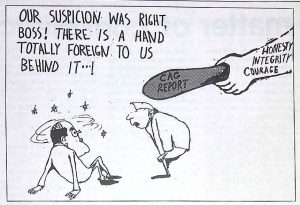
From dispatches
NEW DELHI: “I will not only fight to win. I expect. to win. My faith in a victory in Amethi is a faith in the triumph of will power over money power, of people’s power over state power and of conscience power over muscle power,” Rajmohan Gandhi told a crowded press conference October 27 here. He is con testing the seat against Rajiv Gandhi as a Janata Dal candidate.
Political observers, however, dismiss him as no threat to the Prime Minister. Amethi, is after all, the constituency that has given Rajiv Gandhi land slide victories in the past two elections, they argue.
The 54yearold grandson of Mahatma Gandhi is a bespectacled, soft-spoken journalist turned politician.
The issue is larger than mere politics, Rajmohan Gandhi says.
“To take on Rajiv Gandhi is not a small decision. Dutyrighteous duty, if I may say so — has driven me to the decision, I cannot remain a mute witness to the assault on our pride in India, on the values of the freedom movement and on our hope for the future,” he says.
Electoral battles in India are not quite waged on ideological lines. It is largely a question of how much material and human resources are pumped into each constituency. Isn’t the underdog fazed by the obvious disadvantage he faces on all counts against the “mighty” Prime Minister?
“In material resources my rival is infinitely better placed,” he concedes. “The Janata Dal will doubtless help me in Amethi to the best of its ability. But I will depend above all on the help from the youth from different parts of India for victory in the battle which I have joined. I appeal for their help.” He would be counting on the support of all, “men and women of all communities, castes and classes . . . all those who feel that democratic obligations have been disregarded and flouted by the Rajiv Gandhi government.”
Rajmohan Gandhi perceives the coming battle as “the nation’s fight against corruption.
Article extracted from this publication >> November 3, 1989